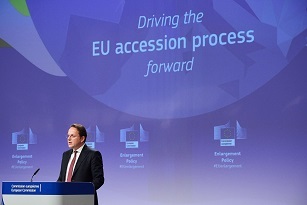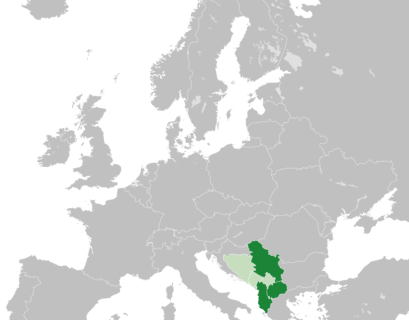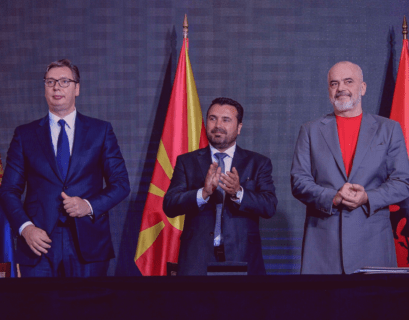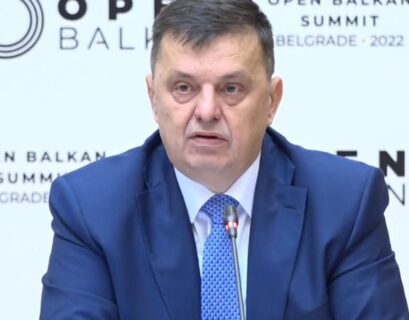by Zoran Nechev, Dragan Tilev, Jovana Marović and Alba Çela
Acknowledgements: This project is co-financed by the Government of Czechia, Hungary, Poland and Slovakia through Visegrad Grants from International Visegrad Fund. The mission of the fund is to advance ideas for sustainable regional cooperation in Central Europe.
This project No. 22020042 was made possible through Visegrad+ Grant from the International Visegrad Fund.
Disclaimer: All views expressed in this research paper are those of the authors and do not necessarily represent the views of International Visegrad Fund.
Impressum
Title: The new EU accession methodology. Is it enough to pull the Western Balkans in?
Publisher: Institute for Democracy “Societas Civilis” – Skopje
Authors: Zoran Nechev, Dragan Tilev, Jovana Marović and Alba Çela
Design: Dejan Kuzmanovski
This publication is available at:
http://www.idscs.org.mk
Introduction
In times when the European Union is struggling to grow stronger from the crisis caused by the Covid-19 pandemic, its efforts in the area of enlargement are seemingly put on hold. For some time already, the Council remains frozen in a situation where the negotiations with both North Macedonia and Albania cannot be started; whereas Montenegro and Serbia are neither moving ahead nor have received their guidelines yet on how they will be integrated in the new Methodology for accession negotiations, initially designed for newcomers in the negotiations.
In light of this, this policy brief will try to shed new light on the new Methodology and elaborate in detail how the negotiation process will look like under these new circumstances for those that wait to start the process and those that are already negotiating. Based on this, the brief seeks to locate the challenges that the Commission, the Council and negotiating countries will face under the new methodology and formulate recommendations how to sufficiently address them in order to return the transformative power of the negotiation process and to avoid complete politization (bilateralisation) of the accession negotiation process.
- How did North Macedonia and Albania get to this point?
After signing the Treaty on Good Neighborly Relations with Bulgaria (2017) and the Prespa Agreement with Greece (2018), the Council of the EU accepted to put the decision on opening accession negotiations with North Macedonia on the agenda for the first time in 2018. After several additional postponements in 2018 and 2019, the decision to open accession negotiations was finally adopted in March 2020, after the methodology for negotiations had been changed. This decision was confirmed by the European Council. Thereby, all member states (27) made it clear that they want to see North Macedonia as a future EU member state and are ready to set the accession requirements without any preconditions (i.e. to define a General EU Position and a Negotiating Framework).
When it comes to Albania, the decision to give a green light to the opening of accession negotiation was accompanied by a list of 15 preconditions[1] to be fulfilled before the first intergovernmental conference. Albania has adopted an Action Plan[2] to fulfill these preconditions and has since managed to fulfill some of them. Among those, the electoral reform package (to be tested in the April 25 elections), it managed to complete the composition of new justice system institutions, most importantly the Constitutional Court, the National Bureau of Investigation (BKH) and Special Prosecutors for Corruption and Organized Crime (SPAK). The problematic draft for a new media law has been returned for revisions by the Venice Commission and its adoption is still pending. The European Commission has evaluated the overall progress made on the preconditions sufficient for opening of the negotiations.
The general elections of 25th of April are the stress test that has been mentioned several times by key high-level politicians from EU member states as well as Commission officials. Free and fair elections which will accepted by all sides on the political spectrum are necessary to move forward on the European agenda.
- New Methodology, new opportunities and new challenges
On February 5th 2020, based on Non-paper suggested by France, the European Commission launched a Communication with a proposal for “Enhancing the accession process – a credible EU perspective for the Western Balkans”, endorsed by the Council on 25th of March 2020,with the aim to drive forward the EU accession process, by making it more credible, more dynamic and predictable. The new methodology aims to balance a political vision with strict administrative requirements of the accession negotiations process. This changed approach intends to make the process of enlargement possible and realistic. As stated in the Communication, enlargement “remains more than ever a geopolitical investment into stable, strong and united Europe”.
Despite the fact that many of the elements and the wording of the proposed methodology sound the same as before, careful analyses bring us to the conclusion that changes are deep and that novelties are substantial. The proposed methodology can be seen as a new political framework for a technical “accession driven” gradual process, fully respecting merit-based principles.
Four key points characterize the proposed new Methodology: political commitment, dynamism, capacities, and reversibility.
The first of the key points, clear political commitment, is at the epicenter of the proposed methodology that should make the process of accession more credible, more accountable, more predictable, and more concrete. During the last decade, it has been noticed quite often that political statements and promises do not correspond with their implementation. This goes equally for the EU as for the accession countries. The new methodology seems to address this weakness through a proposed closer enhanced political steer. The main logic behind this is that once politicians agree on concrete roadmaps and action plans (rule of law, functioning democratic institutions, and stronger links with the Economic reform programme), they first have to give clear public political statements/orientations, and then will have to keep promises and to deliver expected reforms through professional and depoliticized administration in democratic and all-inclusive procedures, all the way during the negotiations.
Dynamism is the second key element that this methodology is bringing forward, as a potential for accelerated accession negotiations. The main novelty here is a grouping of all 33 acquis chapters into six clusters, offering a chance to accelerate the process, for example, with the opening of up to 9 chapters at once. Preconditions for this to happen are good preparation, strategic organization when planning the process, putting the right priorities in good order and making available all necessary resources to be able to implement expected obligations. Benchmarks, as introduced in 2005 and enhanced in 2011, remain, but now with opening benchmarks per cluster, plus interim benchmarks for Chapters 23 (Judiciary and Fundamental Rights) and (24 Justice, Freedom, and Security) as a precondition for any advancement in all other clusters. In the end, closing benchmarks will be set for all chapters. “Fundamentals” (chapters 23, 24, 5, 18 and 32, as well as Economic criteria, functioning of democratic institutions and public administration reform) is the most complex and certainly the most difficult cluster to negotiate. This cluster should lay down mutual trust and ensure a credible negotiation process. It will be the first cluster to be opened at the star and will remain open until the very end of the accession process.
Capacity is the third key point of the new methodologycan be considered as essential for successful negotiations and timely reforms. This more complex and more demanding process has to be matched with appropriate institutional capacities on both sides. If there is a political will on both sides, then the dynamism of the process will depend on the capacities and resources available, also on both sides. No one wants to end with a good document and strong will, but without sufficient capacity to implement.
The fourth key element in the new methodology is reversibility, or positive and negative conditionality. Countries that are progressing with their reforms and advancing in accession negotiations (closer integration and increased funds) will be awarded. On the other hand, they will be be sanctioned if stagnating, dragging behind, slowing down or even backsliding. Complying with the required criteria, and full harmonization with the acquis is a serious challenge. In principle, there is no objection to the positive and negative conditionality, but what raises serious concerns is the newly introduced decision-making model for initiating corrective measures, which is quite different from the one applied so far for Montenegro and Serbia, in which case, proposal can be placed by the Commission or 1/3 of the member states and must be adopted by the Council with Qualified Majority Voting-QMV. According to the new methodology, in the case of North Macedonia and Albania, proposals can be placed by the Commission or a single member state and adopted in simplified procedures, through the reverse QMV. In the case of North Macedonia, and to some extent to Albania, this mechanism can put the country under substantial pressure on very sensitive national issues, not necessarily connected with the acquis, including possible differences in interpretation of some aspects of our bilateral agreements.
- Negotiation Frameworks for North Macedonia and Albania. What we know?
Together with the Decision of the Council of the EU to open accession negotiations (March 2020), the European Commission received the mandate to prepare the General EU Position, including the Negotiating Framework on the conditions under which the European Union will accept North Macedonia as its member state (the same procedure is under way for Albania as well). The European Commission has prepared draft General EU Position (GEUP) and Negotiation Framework (NF), and handed over to the German Presidency of the Council (COREPER and COELA) at the beginning of July 2020, with the aim to be adopted by the General Affairs Council (GAC), as well as confirmed by the European Council until end of 2020.
The negotiating framework is considered to be the most important document in which EU member states determine their main negotiation positions, obliging the European Commission as the institution leading the technical negotiations on behalf of the member states, to adhere to them, with the obligation to regularly provide feedback and to inform member states on the course and results of the negotiations. The NF defines the scope and structure and key requirements to be accepted and procedures and structures of negotiations.
Taking into consideration the complexity and specificity of the NF for North Macedonia (applying the new rules in line with the new revised Methodology) and the announced demands by Bulgaria (and by Greece in line with Prespa Agreement), the draft text, as expected, caused serious inconclusive discussions within COELA and COREPER, in the period between July to December. Due to unreasonable requirements by Bulgaria, the text of the draft NF could not be agreed upon, it did not reach the GAC and is still under consideration of the Council bodies and its Presidency. Therefore, the text of these documents is still not public.
The NF for Albania is also unknown for the time being, however, from what we know the resolution of the ongoing unresolved maritime issue with Greece through the International Court of Justice in the Hague will find its way into the document.[3]
Furthermore, the GEUP prepared by the Commission and refined by the COELA and COREPER Council bodies, to be presented on the (First) Ministerial meeting opening the Intergovernmental Conference on the Accession of the Republic of North Macedonia to the European Union, will supposedly consist of:
- EU Opening Statement for Accession Negotiations, setting the legal frame and political stage and tone of the negotiations within the intergovernmental conference, that will remain open until the end of negotiations, finalized with initialing of the text of Accession Treaty by all sides allowing to North Macedonia becoming a full-fledged member of the European Union in line with Article 49 of the Treaty of the European Union, Copenhagen criteria, including regional cooperation and good neighborly relations,
- Negotiation Framework, defines the 1) principles governing the negotiations, through the enhanced enlargement methodology with the pace based on our own merits and on the other side, depending on the Union’s capacity to absorb new members, and full respect of all required criteria, including political and economic, as well as harmonized legislation and ability to take on the obligations of membership; 2) frames substance of the negotiations, namely adoption and translation in Macedonian language all the acquis and ability to implement it correctly. Derogations are almost impossible, but transitional measures, if well elaborated can be negotiated. As for our participation into EMU and Schengen area, separate procedures will apply, after entry into the EU; 3) sets clear negotiating procedures, starting with formal process of screening, opening negotiations by clusters (6 clusters), starting from the Fundamentals, using opening benchmarks, interim benchmarks for rule of law chapters (23 and 24) and closing benchmarks per chapter (33 chapters). All decisions on opening and closing of clusters and chapters will be taken by unanimity; 4) sets procedure and organization (technical) details for smooth negotiation process, and 5) defines the grouping of the chapters and contents of the clusters.
- Application of the new Enlargement Methodology to Montenegro and Serbia: Much Ado About Nothing?
Montenegro is currently trying to meet 83 interim benchmarks for Chapters 23 and 24 (45 for Chapter 23 and 38 for Chapter 24), while Serbia has a total of 98 for these two chapters (48 for Chapter 23 and 50 for Chapter 24).[4] In order to meet these interim benchmarks, both Serbia and Montenegro have prepared action plans approved by the European Commission. The Commission also has the balance clause at its disposal which allows to block a country from opening new negotiating chapters until satisfactory progress on reforms under chapters 23 and 24 has been achieved. Negotiations so far have shown that regardless of the logic of the approach and the corresponding principles, success in these countries in implementing reforms and strengthening the rule of law is limited.It thus requires concretization of instruments and a more committed approach and effective monitoring. Is this possible to achieve with the new methodology? What do we know so far about its application to Montenegro and Serbia?[5] Although Montenegro and Serbia accepted a new methodology in May[6] and July 2020,[7] respectively (though in the case of Serbia it was done informally by the announcement of the President), the European Commission came only out in March 2021 with certain announcements on how the methodology could be adapted to these two countries already negotiating membership, while the presentation of a non-paper on the application of the new methodology is not expected before June. Such a delay, especially in the case of Montenegro, which has opened all chapters and thus gained the opportunity to open all six clusters at once (while Serbia has opened a total of 18 chapters so far), is not justified, and may be an indicator of the lack of adequate strategy within the European Commission in relation to the application of methodology. Having in mind what we know so far about the guidelines for the application of the revised enlargement methodology to Montenegro and Serbia the negotiating framework will not change significantly while the most important remarks are as follows:
The focus remains on the interim benchmarks as key instruments for improving the rule of law: These benchmarks were defined at the very beginning of the negotiations; they are not specific (concrete) enough to help the negotiating country to better respond to the demands.
The (same) action plans are still central elements for meeting the interim benchmarks: Once adopted and prepared, these action plans have been comprehensive, but in the meantime have become outdated and cannot help countries meet the interim benchmarks without adapting or rethinking indicators and new activities.
No other chapter will be closed until the interim benchmarks are met: Seen as a particularly important instrument and rule in disciplining and motivating a candidate country,[8] it is not really a novelty since there has so far been the possibility of activating the balance clause while the chapter could not be closed permanently (only temporary) until Chapters 23 and 24 are closed.
Corrective measures will be taken only if there is a problem in meeting the interim benchmarks: Problems in meeting the interim benchmarks already exist, hence a different approach and more precise instruments are required.
Existing chapters will be grouped into six clusters: For Montenegro, this is no longer relevant since the country opened the last negotiating chapter in June 2020. Serbia has opened a total of 18 negotiating chapters so far, and the other chapters are in different clusters. This potentially means that the procedure for meeting the opening benchmarks will only apply to individual parts of the cluster, when the time comes, and about which, as before, the EU member states will have the final say based on results in the rule of law.
Regular political international conferences between the EU member states and the candidate countries at least once a year: This novelty is good for sending strong political messages and committing candidate countries, but without overcoming the political decision-making in the Union that now takes precedence over merit-based will not have a special role in the process.
Incentives still unknown: Although the new methodology introduced in February last year predicted that candidate countries would be rewarded in line with the results achieved, it is still unclear what this will look like in practice, which is particularly problematic given that insisting on sanctions alone may not be particularly encouraging for the reforms.
- Comparison between SRB/MNE and ALB/MKD
It has to be noted that the EU enlargement policy and accession negotiations process with it, has evolved substantially since its beginnings. The goal remains the same, full flagged EU membership, the paths toward that goal, means, and dynamism are constantly changing however. Over time, the changing political environment within the EU is causes substantially strengthened and stricter rules and criteria. Since the “big bang” expansion of the EU (10 plus in 2004), every new enlargement was followed with more rigid criteria and stricter rules, like at the time of accession of Bulgaria and Romania (2007), Croatia (2013), and further on with opening of the negotiations for Montenegro (2012) and Serbia (2014). Inefficiency of the last two has provoked first France, and then the EU as a whole, to change yet again the accession negotiation process and to introduce new unique rules.
The intention was to make the process more political, more dynamic and more just for all, based on countries individual merits, but at the same time creating an equal playing field for all the countries from the Western Balkans region. In order to achieve this goal, initially the Commission, and consequently the Council bodies and MS’s representatives (COELA and COREPER), are trying to transpose in practice all elements from the New Methodology into the Draft Negotiation Frameworks designed for North Macedonia and Albania, as well as Document on the application of the revised Enlargement Methodology to the accession negotiations with Montenegro and Serbia.
The position, so far, of most of the EU member states is that the new generation of negotiation Frameworks with all elements from the new methodology will apply to North Macedonia and Albania (latter to Bosnia and Herzegovina and Kosovo), while at the same time negotiation frameworks for Montenegro and Serbia will remain as they are (in legal terms), but these two countries will have to accept the new Methodology and to comply with it, as described in that additional explanatory document, except in the cases when it does not contradict with their negotiation frameworks.
If this position of the Council sustains, the principle of “equal playing field” is seriously in question, since different set of rules will apply to different groups of countries (MN and SR against MK and AL), which at the end instead bringing the region closer together, will cause further divisions and potential bitterness. Further on, differences in the scope and procedure of proposing corrective measures can have strong negative unpredictable impact on the process as a whole.
- Conclusion
The proposed new Methodology is more complex, more political and demanding (lessons learned) than any other before, but if both sides are persuaded and dedicated, it offers a chance to lay down a credible, dynamic and sustainable political process.
There are many unknowns in how the process will look like under the new methodology, however, the main one will be how the increased politicization will impact the accession negotiations of both North Macedonia and Albania. We still need to see how the countries already negotiating will be integrated in the new methodology. And finally, there is a need for better elaboration of the differences among negotiation frameworks and potential consequences caused by different decision-making procedures when initiating corrective measures, for the two groups of countries (those waiting to start negotiations and those already negotiating). The risks to create further gaps are substantial. Success of the new methodology may depend on correct understanding of the consequences.
Information about the International Visegrad Fund –
The Visegrad Fund is an international donor organization, established in 2000 by the governments of the Visegrad Group countries—Czechia, Hungary, Poland and Slovakia
to promote regional cooperation in the Visegrad region (V4) as well as between the V4 region and other countries, especially in the Western Balkans and Eastern Partnership regions. The Fund does so by awarding €8 million through grants, scholarships and artist residencies provided annually by equal contributions of all the V4 countries. Other donor countries (Canada, Germany, the Netherlands, South Korea, Sweden, Switzerland, the United States) have provided another €10 million through various grant schemes run by the Fund since 2012.
Address:
Hviezdoslavovo námestie
9 811 02 Bratislava Slovakia
[1] “The Opening of Accession Negotiations: A New Hope for Albania”, TOBIAS RUETTERSHOF, Tirana Observatory https://tiranaobservatory.com/2020/05/08/the-opening-of-accession-negotiations-a-new-hope-for-albania/
[2] The Action Plan makes the distinction between the measures that should be fulfilled prior to the first and second intergovernmental conference however interestingly uses the term “priority” instead of condition or precondition.” Action Plan to fulfill priorities set by the European Council , 21.09.2020 (PLANI I MASAVE PËR PËRMBUSHJEN E PËRPARËSIVE TË PËRCAKTUARA NGA KËSHILLI I BASHKIMIT EVROPIAN) https://www.parlament.al/Files/Integrimi/plani%20i%20veprimit%20FINAL.pdf
[2] IMO definition: https://eeas.europa.eu/delegations/albania/20144/most-frequently-asked-questions-international-monitoring-operation_en
[3] “Albania and Greece seek joint maritime border resolution from The Hague”,
[4] Jovana Marović, Tena Prelec, Marko Kmezić „Strengthening the Rule of Law in the Western Balkans: Call for a Revolution against Particularism“, BiEPAG, January 2019, http://biepag.eu/wp-content/uploads/2019/03/Strengthening-the-Rule-of-Law.pdf
[5] “EU’ s Várhelyi warns Serbia & Montenegro about rule of law in closing chapters“, N1, 17 March 2021, https://rs.n1info.com/english/news/eu-s-varhelyi-warns-serbia-montenegro-about-rule-of-law-in-closing-chapters/
[6] „Montenegro accepts new methodology, good platform for intensifying reforms”, the Government of Montenegro, 15 May 2021, https://www.gov.me/en/News/224514/Montenegro-accepts-new-methodology-good-platform-for-intensifying-reforms.html
[7] “Serbia accepts new methodology in EU accession talks – President Vucic”, SeeNews, 10 July 2020, https://seenews.com/news/serbia-accepts-new-methodology-in-eu-accession-talks-president-vucic-705971
[8] Aleksandar Ivković “Application of the new methodology to Montenegro and Serbia: Principles remain the same, more emphasis on interim benchmarks”, European Western Balkans, 24 March 2021, https://europeanwesternbalkans.com/2021/03/24/application-of-the-new-methodology-to-montenegro-and-serbia-principles-remain-the-same-more-ephasis-on-interim-benchmarks/










